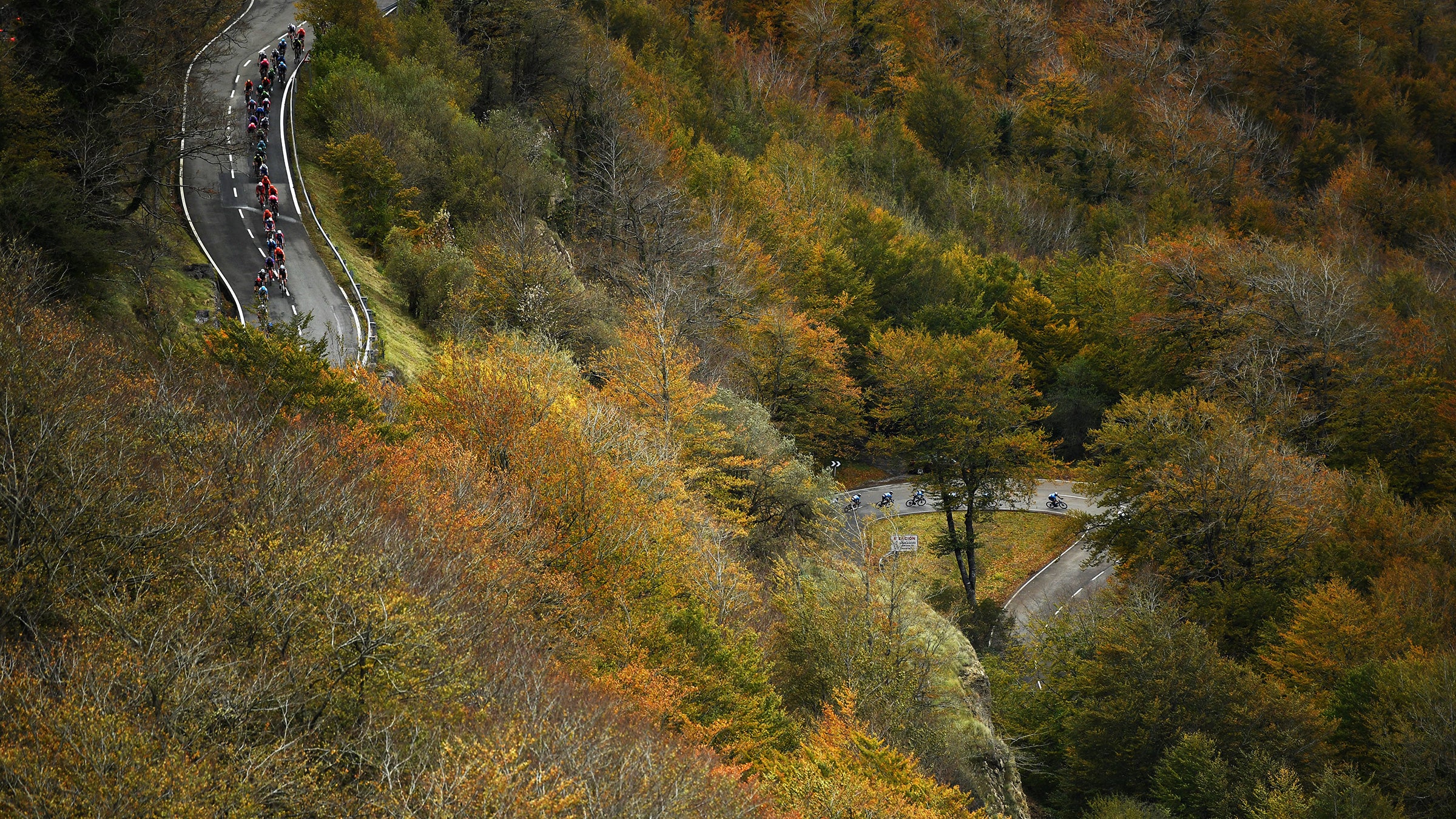Vuelta a España: Rain in Spain making a different race so late in season

The 2020 Vuelta a España could be decided by the weather. (Photo: David Ramos/Getty Images)
There won’t be any stinking-hot days in this year’s Vuelta a España.
In a typical year, the Spanish grand tour would see temperatures in excess of 95 degrees Fahrenheit, under a blistering Andalucían sun.
But, there’s nothing typical about 2020.
With most of the 18 stages tucked neatly into the northern half of Spain, and the race running well into November due to the coronavirus pandemic, heat will be the least of the worries in the final grand tour of 2020.
Everyone in the bunch expects cold temperatures, rain, and wind to be a decisive factor in this year’s Vuelta.
“Some riders can stand the cold and rain better than others, and they will have an advantage,” said Thursday’s stage winner Dan Martin (Israel Start-Up Nation). “It’s not normal to race into November.”
This year’s coronavirus pandemic forced race organizers to radically alter the Vuelta template.
Not only is the organization having to invest time, money, and manpower into creating a safer racing environment — which riders say is the healthiest so far of any race in 2020 — the race was also rescheduled. With the peloton set to enter Madrid on November 8, the riders will be racing deep into Spain’s notoriously unpredictable fall weather.
“It’s rainy and cold, and it will be full-gas racing,” said race leader Primož Roglič (Jumbo-Visma). “Every day it’s like that, with cold, wind and rain. For sure it will have its role, we have to adapt and race how it is.”
In the southern half of Spain, October and early November typically boast see crisp mornings and sunny afternoons, with idyllic fall temperatures in the 60s and 70s Fahrenheit. That’s not always the case in the northern half of Spain. Big storms can plow in off the northern Atlantic, and douse lower elevations with pelting rain and wind, and bury the higher passes under heavy, wet snow in the Cantabrian range and Pyrénées.
Simply by chance, this year’s route was drawn up to stay primarily in northern Spain. The coronavirus pandemic already forced organizers to cancel the planned start in The Netherlands, and later removed two planned stages in Portugal. Overnight, with worsening health conditions in France, Sunday’s decisive climbing stage up the Col du Tourmalet has been canceled. Instead, Sunday’s sixth stage will remain within Spanish territory, and finish at the Formigal ski area high in the Spanish Pyrénées.
No one could have guessed when organizers planned the route last year that the race would be pushed back from September into late October and early November.
With the double-whammy of COVID-19 and unpredictable weather, everyone in the peloton knows that the race could be altered at any point.
“I get the feeling that we’re racing every day as if it could be the last race of the year,” said Trek-Segafredo’s Koen de Kort. “Nothing will be given away. It’s going to be all-out racing every day, and we’ll race like that for as long as it lasts. Hopefully, that’s all the way to Madrid.”
Already in the opening four stages of the Vuelta, weather has been a factor. Cooler temperatures, some strong wind, and rain have created intense racing conditions. Forecasters are calling for a rough day Sunday in the rerouted stage to Formigal, with forecasted rain and temperatures in the mid-40s F.
Looking ahead to the decisive mountain stages at Farrapona and the Angliru next weekend, forecasters are predicting cool, but sunny skies for the important climbing mountaintop finales.
“[Formigal], Farrapona, and the Angliru will be the three decisive stages of this Vuelta. That’s where the big gaps will be made, and if it’s cold, everything will be even that much harder,” said Martin, poised in second-place overall. “Like in any grand tour, a bad day can cost you in the overall, and it doesn’t matter on what stage it might be.”
Martin, who won his first race in two years in Thursday’s stage, said seeing the Vuelta race so deep into November in what’s been an atypical season should make for a hard-fought and unpredictable GC battle.
“It’s been a strange year, and we’re seeing some great rides from different riders this season,” Martin said. “It’s a very open race, but I see Enric Mas going well, and he’ll be very motivated with Movistar. Jumbo-Visma also has a strong team, and we’ll see what Ineos can do with [Richard] Carapaz. For sure it’s going to be a big fight.”
Add some rain, wind, cold, and maybe a touch of snow, and this Vuelta is sure to be unlike any other.